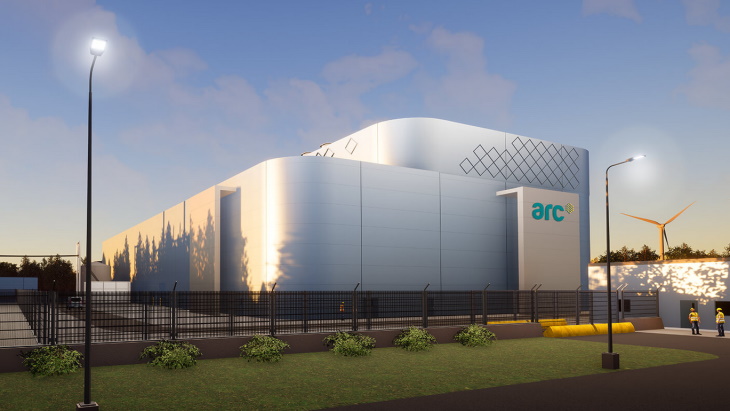The strategy outlining how the province aims to transition to clean energy calls for the addition of 600 MWe of capacity at the Point Lepreau Nuclear Generation Station by 2035, doubling New Brunswick's current nuclear capacity.

A vision of an ARC-100 SMR plant (Image: ARC)
Powering our Economy and the World with Clean Energy – Our Path Forward to 2035 focuses on affordability, energy security and reliability, regulatory reform and economic growth. As well as SMRs, it calls for an almost five-fold increase in wind and solar capacity, with increased roles for hydrogen, renewable natural gas, and biofuels - traditional natural gas serving as a transition fuel both locally and globally. Transmission upgrades and enhanced connectivity within Atlantic Canada will play an increasingly important role in balancing the grid, while adding electric vehicle charging stations and increasing use of biofuels and hydrogen will transform the transport sector.
The roadmap included in the report sees the first 150 MWe of SMR capacity coming online in 2030-2031, with another 450 MWe starting up in 2035. As well as installing new SMR capacity, the strategy also outlines an initiative to increase the operating efficiency of the existing Point Lepreau nuclear generating satation, with the government saying it will work with utility NB Power "to enable the establishment of a partnership with another nuclear operator to improve performance, lower operational risk and lower cost".
New Brunswick Premier Blaine Higgs said the strategy balances addressing climate change with the province's growing energy needs and demands. "We have a generational opportunity in front of us, to change the way we use energy to live and work, that will lead to a cleaner environment, more economic growth and, most importantly, an affordable and secure energy supply for all New Brunswickers" he said.
"Climate change and the need to move away from greenhouse gas-emitting fuels are creating a global energy transition," the province's Natural Resources and Energy Development Minister Mike Holland said. "Our actions will collectively reduce our greenhouse gas emissions by nearly half by 2035, putting us well on our way to achieving a net-zero economy and creating new economic opportunities and prosperity for our province."
NB Power, operator of the existing 600 MWe Candu plant at Point Lepreau, earlier this year published its own strategic plan highlighting the need to phase out coal by 2030 and achieve net-zero electricity supply by 2035. The utility, a Crown Corporation owned by the province, currently generates electricity from nuclear, hydro, coal, oil and diesel powered stations.
In July, NB Power, in partnership with SMR developer ARC Clean Technology Canada Inc, submitted an environmental impact assessment registration document and an application for a site preparation licence for an SMR at Point Lepreau. The deployment of ARC Clean Technology Canada Inc's ARC-100 sodium-cooled fast reactor in New Brunswick and is part of a joint strategic plan on SMR development and deployment released by the governments of Ontario, Saskatchewan, New Brunswick and Alberta in 2022.
Researched and written by World Nuclear News